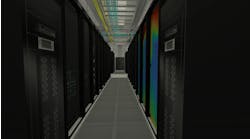Master-planned communities, introduced in the mid-20th century, are a development best practice delivered as a self-contained, holistically planned, unified community, with a full range of infrastructure, employment opportunities, services, and more. Quantum Loophole has applied this long-term planning template to create Quantum Frederick, the first-ever master-planned data center community.
Quantum Frederick: the Industry’s First Master-Planned Data Center Community
Inspired by lessons learned from the historical approach to data center developments, Quantum Frederick is purposefully designed to address long term infrastructure demands at scale, while minimizing the impact on the local community and environment.
By master planning data center communities, municipalities and the surrounding areas benefit from a 15-20 year roadmap of the vision for the area - typically aligned with their own community master-plan - including details of underground infrastructure for water, communications services, sewage, and more. This includes expected above-ground plans for the development of roadways, walkways, trails, greenscapes and more, designed in alignment with local community interests and needs.
With a master plan in place, future growth is considered at the onset, with site selection and infrastructure requirements carefully considered before all else. Quantum Frederick, is purposely designed so that the 3.5 square mile area provides clear boundaries for where data centers should and should not be located.
By default, data center developments need robust power, cooling water and connectivity solutions. With this in mind, Quantum Loophole’s purposeful approach to site selection involves identifying industrial sites where previously existing infrastructure may be repurposed and rejuvenated for cleaner and more modern uses.
Quantum Loophole realized this vision in 2021 when it acquired a 2,100+ acre site in Frederick, Maryland, a former Alcoa aluminum plant.
Economic Benefits of Data Center Development
The benefits of master-planning data center communities is also helpful to city and county planners, and state legislatures grappling with ways to boost tax rolls to support the plethora of services and educational needs of their communities. To tap into these benefits, the state of Maryland passed new data center tax incentives, approved by the Maryland General Assembly during the 2020 legislative session and signed into law by Governor Larry Hogan, is designed to make Maryland more competitive as states work to attract more data centers to the region.
In October 2023, the Maryland Tech Council sponsored a report by the Sage Policy Group to study the economic impacts of Quantum Frederick. It identified that the development will support over 48,000 jobs in Frederick County over a 15-year period. Quantum Loophole is revitalizing an existing industrial site for its master-planned data center community which will support $3.1 billion in new income for county workers. During the construction phase of the development, it is anticipated to generate at least $25.8 million in county tax revenue. When operational, Quantum Frederick is anticipated to support over $41 million in county tax revenues annually.
The tax revenue generated will benefit not just Frederick County, but also the wider Maryland economy, funding improvements in local infrastructure, schools and internet access. As a result of Quantum Frederick’s master-planned data center community, a number of jobs will be created, offering local residents opportunities in the growing technology sector and the ability to work closer to home. Another key benefit of the master planned approach is ensuring centralized development that respects and maintains the integrity and character of the surrounding community.
The Future is Clean, Green Data Center Developments
Quantum Loophole is focused on developing data centers better through master-planning data center communities. Data center development needs land, power, cooling water and connectivity — and Quantum Frederick is designed to offer this sustainably, through recycled water solutions, decarbonization initiatives, and reutilizing and modernizing existing infrastructure.
Purposeful site selection allows Quantum Loophole to reutilize the Frederick County brownfield site, repurposing existing infrastructure from the old smelter plant, while creating a solution for the sustainable advancement of human innovation, using nature as a technology. Over 600 acres of Nature Reserve will act as a carbon sink, helping Frederick County and the state of Maryland achieve carbon neutrality goals, as well as functioning as a community space through nature trails, beautiful views and afforestation efforts.
By drawing on decades of history, Quantum Frederick, the first master-planned data center community in Maryland, is already on a trajectory to improve the data center development process. Through a visionary, holistic and proactive approach — leveraging Maryland’s unique strategic location and proximity to existing mass-scale internet infrastructure — the industry can avoid a reactive pattern of sprawl and create an end product that allows consumer and business data to work for them and their communities.







